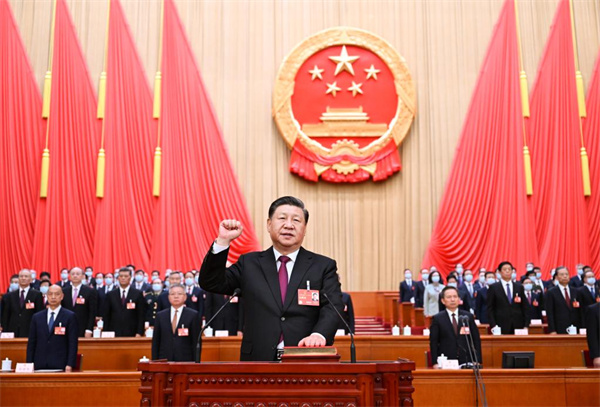
BEIJING, March 14 -- About five months after his election as general secretary of the Communist Party of China (CPC) Central Committee, Xi Jinping won his third term as Chinese president at the annual session of the national legislature, which concluded on Monday.
At the first session of the 14th National People's Congress (NPC), Xi was also elected chairman of the country's Central Military Commission. Assuming the top posts in the Party, the state, and the armed forces, Xi is leading the country with 1. 4 billion people on a new journey to modernization.
Wrapping up the session, Xi delivered a closely-watched speech to a gathering of nearly 3,000 lawmakers. "The people's trust is my biggest motivation moving forward and is also a weighty responsibility on my shoulders," Xi said.
Xi announced that the central task of the entire Party and all Chinese people, from this day forward to the middle of the century, is to build China into a great modern socialist country in all respects and advance national rejuvenation on all fronts.
"The relay baton has been passed on to our generation," he said.
A decade ago, when Xi was first elected Chinese president, he expounded on the "Chinese Dream," saying the dream is about making the country prosperous and strong, rejuvenating the nation, and delivering a happy life to its people.
Modernizing China has been a persistent pursuit of the Chinese since the Opium Wars. Over the course of a century, generations of the Chinese, led by the CPC, have charted a distinctively Chinese path toward that goal.
Born in 1953, Xi started his political career as the Party chief in a small village in northwest China. From there, over the past half-century, Xi worked his way up through almost every level of the Party's hierarchy. He has amassed extensive experience and made noteworthy accomplishments throughout his career.
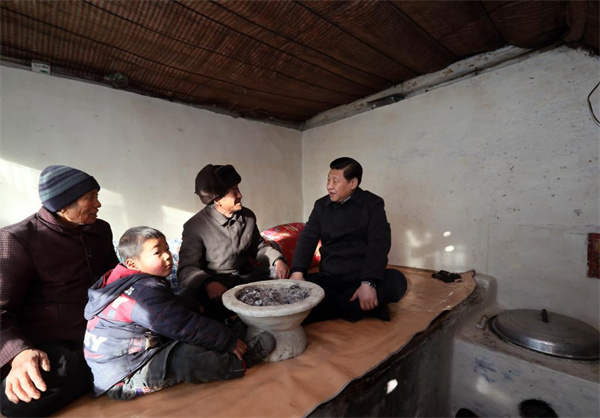
Xi was first elected to the Party's top post in late 2012. For the first time, the position was held by a person born after the founding of the People's Republic of China in 1949.
Since then, he has taken the nation on an ambitious path of revival, according to international media reports. Xi has a clear vision for China, to see it as a powerful country in the world, the reports said.
THE CORE
In 1969, Xi left Beijing for a small village on the Loess Plateau to live as a farmer, sharing the same fate as millions of youths who came of age during the Cultural Revolution.
For someone like Xi who grew up in Beijing, life in the countryside was extremely difficult at the beginning. Villagers often went without meat for several months. Despite the hardships, Xi looked back on this experience as the time when he truly understood the struggles of the common people and society.
This unique experience fueled Xi's determination to always do something for the betterment of the people.
While many of his college peers opted to go abroad, Xi applied to work in a poor county called Zhengding in Hebei Province in the early 1980s.
In 2012, soon after taking office as the general secretary, Xi visited poor rural families in Hebei. In Gu Chenghu's home, Xi sat on a heated brick bed and chatted with him.
"I have come here to check your living conditions and see what the Party's leadership can do more for you and people like you," Xi said.
He held up Gu's sleeve and showed it to the officials around him, saying, "Look, his coat is worn out. "
At the time, there were around 100 million rural Chinese living under the poverty line of earning an annual income of 2,300 yuan (about 366 U. S. dollars).
In less than a year, Xi put forward the "targeted poverty alleviation" strategy, and over the span of about eight years sent 255,000 work teams and 3 million cadres to villages, providing one-on-one assistance to impoverished farmers.
Xi himself conducted over 50 inspections and research studies on poverty alleviation, which included visits to all 14 regions with high concentrations of extreme poverty.
On Feb. 25, 2021, Xi announced that absolute poverty had been eliminated in China.
China's poverty reduction rate has been notably faster than the global average, making it the country with the largest number of people lifted out of poverty worldwide.
"If not for Xi's personal push, poverty reduction would have been even more difficult and taken longer," said Zeng Shoufu, who once worked as a village poverty alleviation cadre in Fujian province.
Another challenge was corruption. Upon taking the Party's top office in late 2012, Xi cautioned that "if corruption is allowed to spread, it will eventually lead to the collapse of the Party and the fall of the state. "
Less than a month into the job, he fired the first shot in his war against corruption. Over the course of ten years, high-ranking "tigers," including a former member of the Standing Committee of the Political Bureau of the CPC Central Committee, were taken down.
Over 500 centrally-administered officials, most of whom were at or above the ministerial level, were investigated. Crooked officials who fled overseas were brought back through anti-corruption operations initiated by Xi.
In 2018, he announced that an "overwhelming victory" against corruption had been achieved. But the campaign did not end there. After the 20th CPC National Congress, another nearly 20 senior officials were investigated or punished for corruption.
Early this year, at the plenary session of the CPC Central Commission for Discipline Inspection, the top graft-busting agency, Xi urged a crackdown on corruption that involves both political and economic issues. He emphasized the need to prevent leading cadres from becoming spokespersons or agents of interest groups and power cliques.
The success of poverty alleviation and anti-corruption has won Xi popular support, but this is not the only reason he was unanimously elected into the top office of the Party and the state. In the past decade, many long-standing problems in the country were solved under his leadership.
China has steadily developed and become stronger overall, with an average annual economic growth of 6. 2 percent over the past decade. It was more than twice the global average. Per capita GDP has doubled to over 12,000 U. S. dollars.
China's share of the world economy has increased from 11. 3 percent in 2012 to 18. 5 percent at present. The output of grain has consistently been abundant.
In the past, China's manufacturing industry was often referred to as "big but not strong. " It took a billion pairs of socks to buy a Boeing plane, some said. Today, China has developed its own large passenger aircraft, and technological advancement contributes over 60 percent to the country's economic growth.
China's digital economy is the second-largest in the world, and its new energy vehicle production and sales have ranked first for eight consecutive years.
Shan Zenghai, a technician at the construction machinery manufacturer XCMG, recalled how in 2017, Xi toured the company's workshop and mounted an all-terrain crane.
"He gave us great encouragement, saying that the real economy should never be sidelined," Shan said. "He also said the Chinese economy must transition from high-speed growth to high-quality development. "
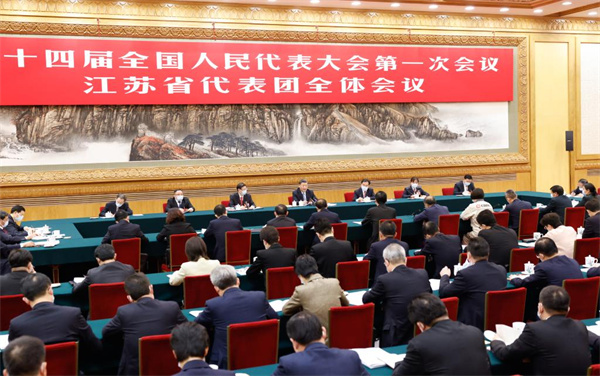
During a deliberation meeting at this year's NPC session, Shan sat down with Xi again and informed him that all the components of the crane that Xi once mounted are now manufactured in China.
"Are the chips in your company's cranes domestically made?" Xi asked.
"Yes. All are made in China," Shan replied.
In the past ten years, while eliminating absolute poverty, China has built the world's largest education, social security, and medical and healthcare systems. China is adopting measures to provide more accessible and continuous medical and healthcare services to farmers. The life expectancy of the average Chinese increased to 78. 2 years in 2021, nearly 2 years higher than that of the average American in that year.
Without Xi, China's ecological environment protection would not have attained historic improvements, observers said. The average concentration of small particles, PM2. 5, in the air has decreased for nine consecutive years in major cities, with a cumulative reduction of 57 percent. The once-common occurrence of smog enveloping the skies of northern China has now become rare.
Xi pushed for green development as he tackled pollution across the board. He announced that China aims to peak carbon emissions by 2030 and achieve carbon neutrality by 2060. He also pushed for the ratification of the Paris Agreement on climate change.
Also thanks to his efforts, China was among the first to sign the Regional Comprehensive Economic Partnership -- the world's largest free trade agreement -- and has expanded its free trade pilot zones from one to 21. The entire island of Hainan was turned into a free trade port.
Xi is a strong advocate of the spirit of self-reliance and self-improvement. He emphasized the need to enhance the confidence and pride of being Chinese, and the importance of promoting China's excellent traditional culture, stating that blindly following others is not the way forward.
"Are not Hollywood's films like 'Kung Fu Panda' and 'Mulan' based on our cultural resources?" he said.
Xi's reform measures have achieved "historical changes, systematic reshaping, and overall reconstruction" in many fields, ranging from the economic, political, cultural, social, and ecological protection systems, to national defense and the Party's own institutions.
He made the decision to enshrine the statement of "allowing the market to play a decisive role in resource allocation and letting the government play a better role" into the Party's documents and led the establishment of the National Commission of Supervision, a powerful anti-corruption agency to oversee every single person in public office.
In late 2012, Xi initiated the eight-point decision on improving conduct. This is regarded as a lasting institutional solution to malaise such as squandering, indulging in pleasure, and extravagance. Through this move, Xi succeeded in curbing practices previously deemed uncontrollable.
In other aspects of institutional development, Xi oversaw the reform of the talent system to enable researchers at the forefront of science to benefit from their intellectual property rights.
A milestone CPC resolution adopted in 2021 states that the Party has affirmed Xi's core position on the Party Central Committee and in the Party as a whole, and affirmed the guiding role of Xi Jinping Thought on Socialism with Chinese Characteristics for a New Era.
This, according to the resolution, reflects the common will of the Party, the armed forces, and Chinese people of all ethnic groups, and is of decisive significance for advancing the cause of the Party and the country in the new era and for driving forward the historical process of national rejuvenation.
Xi considers the affirmation of his core status to be a weighty responsibility. In his words: "To honor the trust of the Party and the people, I will dedicate myself to the utmost and be willing to endure any hardship without hesitation. "
Party theorists say Xi's sustained leadership in the Party and state apparatus provides direction, stability, and continuity for China's development. They said this is conducive to strengthening the Party's overall leadership and is an important manifestation of the political and institutional advantages of socialism with Chinese characteristics.
Lu Man, who is an NPC deputy and head of an agricultural cooperative in Jiangsu Province, said the unanimous vote electing Xi as the Chinese president is a major outcome of this year's "two sessions. " Lu added that the result is what people have been hoping for and is required to advance the Party and the state's causes.
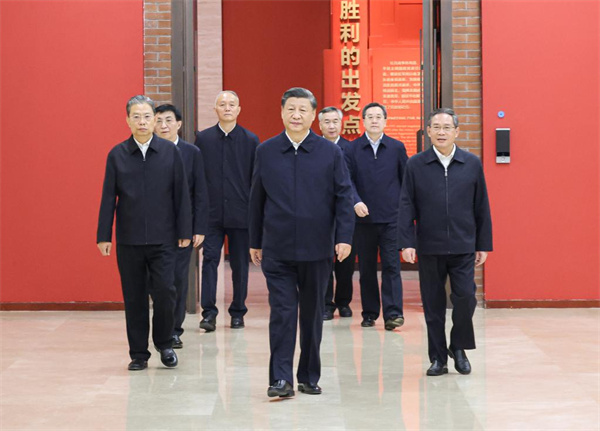
From the 20th CPC National Congress to this year's "two sessions," a new cohort of officials have assumed positions of governance, including members and alternate members of the Party Central Committee, ministers, and provincial-level Party chiefs. Xi urged them to strive diligently and avoid letting down the expectations of the people.
According to Party insiders familiar with the matter, these new leading officials "share some common traits," including their strong abilities in terms of political judgment, comprehension, and execution.
In the meantime, the military has also completed its leadership transition, with a new Central Military Commission team and a new defense minister.
In early November, Xi visited the military's joint operations command center and called for "comprehensively strengthening military training and preparedness. " He emphasized multiple times "the absolute leadership of the Party over the people's military. "
According to Xi, the Party's leadership defines the fundamental nature of Chinese modernization.
Given the immense size of the Party and the country, it is impossible to achieve anything without the authority of the CPC Central Committee and its centralized and unified leadership, as well as the conformity of the nation, Xi said.
"General Secretary Xi has the charisma to unify the whole Party. He is our backbone as the nation charges ahead on the new journey toward modernization," said Cai Hongxing, president of Yanbian University, who is also an NPC deputy.
A NEW START
The NPC is considered a major platform to turn the Party's propositions into the will of the nation. This means that grand strategies for Chinese modernization, laid out at the 20th Party congress, are being translated into concrete plans at the "two sessions. "
In 1979, late Chinese leader Deng Xiaoping introduced the term "Chinese modernization" at the beginning of the reform and opening-up as a reference to Xiaokang, or a well-off society. After achieving this goal, the CPC proposed the goal of a moderately prosperous society in all respects.
Based on media reports, Xi first used the term "Chinese modernization" in a public speech in December 2015 while leading efforts to formulate a development blueprint aimed at propelling the nation toward a moderately prosperous society in all respects.
Six years later, during the centennial celebration of the CPC, Xi declared that this objective had been achieved.
Xi has continued to refine the strategic deployment of Chinese modernization, moving from building a moderately prosperous society in all respects to embarking on a new modernization journey.
At the 19th CPC National Congress, he established a "timetable" for achieving modernization, and at the 20th Party congress, five years later, he presented a "road map" to realize this goal.
Xi summarized five major features of Chinese modernization: a huge population, common prosperity for all, coordination of material and cultural-ethical advancement, harmony between humanity and nature, and peaceful development. This sketch of Chinese modernization is now even more precise, well-conceived, and feasible.
"He has given a lot of thought to modernization and put it into action. Throughout his career, he has worked from inland to coastal regions and from local to central levels. No matter where he worked, Xi was an active reformer and broke new ground in advancing modernization," said David Ferguson, who edited four volumes of the English version of "Xi Jinping: The Governance of China. "
The objectives for 2023 are to do solid groundwork for building a modern socialist country. The five years starting from 2023 is deemed a crucial phase.
The national legislature has approved the government's growth target of around 5 percent for 2023, which is two percentage points higher than the actual growth last year. This means China's economic growth in a single year is equivalent to the GDP of a mid-sized developed European country.
But China has 1. 4 billion people, lowering the country's development ranking in terms of per capita figures. Explaining the 5-percent growth target, Xi said if China will lift per capita GDP to that of a midlevel developed country by 2035, it is imperative to maintain reasonable growth on the basis of improving quality and efficiency. And China has the capacity to do so.
"High-quality development is the primary task of building a modern socialist country," he said.
Almost all 31 provinces, autonomous regions, and municipalities on the Chinese mainland had set higher growth targets. Shanghai has set its target at 5. 5 percent, while Xinjiang and Tibet have set their targets at around 7 percent and over 8 percent, respectively.
Wang Xiangming, a researcher at the Renmin University of China, said a notable change in Chinese society after the 20th Party congress is that people have a stronger sense of developing the economy. "Without a solid material foundation, it is impossible to achieve socialist modernization. "
A major change is a shift in COVID-19 response. Over the past three years, China's rigorous response measures have effectively protected the lives and health of the people. Last November, Xi presided over a Party leadership meeting to adjust COVID-19 response measures. Three months later, it was declared that China had emerged victorious from the pandemic.
Kristalina Georgieva, head of the International Monetary Fund, said China's optimization of its COVID-19 policy will likely be the single most important factor for global growth in 2023.
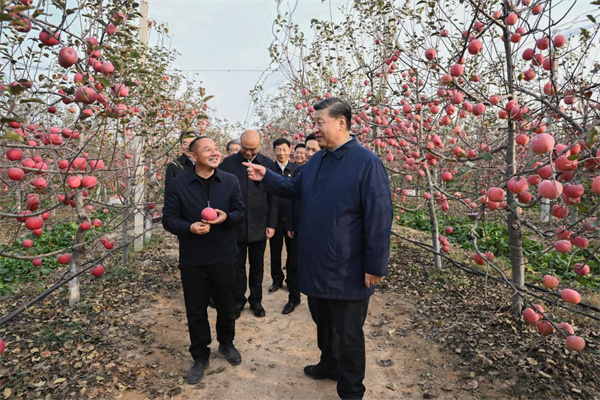
Xi made his first out-of-town trip after the 20th Party congress to the countryside. He visited a fruit orchard in Nangou, Shaanxi province and candidly asked fruit farmers how much they could earn in a day, what their incomes were like, and how their families were doing.
"What are the techniques for picking apples?" he asked and picked a big red apple himself as farmer Zhao Yongdong demonstrated.
Outside an apple sorting workshop in the village, people gathered around Xi. "His top concern is the livelihoods of the people," said Zhang Guanghong, a village cadre.
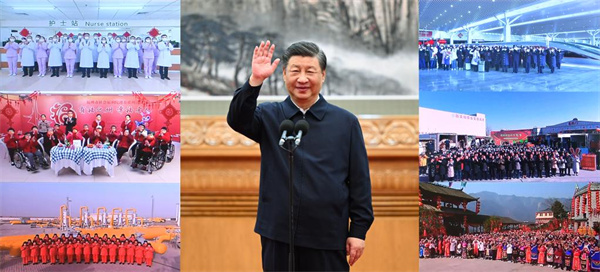
Before the Spring Festival, Xi spoke with cadres and people from across the country via video calls. He asked a cadre from a Qiang ethnic minority village in Sichuan province about the number of tourists and their income. After Xi learned that the per capita income of the whole village exceeded 40,000 yuan last year, he exclaimed "Not bad!"
Wei Zhuo, a tourist, told Xi about her experience in the village. In particular, she said, the local Sichuan-style cured pork was delicious. "The general secretary asked me to eat more," Wei said. "I feel that he cares a lot about rural development and boosting the income of the common people. "
Xi told the accompanying cadres that "the most arduous and demanding task of building a modern socialist country still lies in the countryside. " At the Central Rural Work Conference in late 2022, he said to strengthen the country, agriculture must be strong first, emphasizing that ensuring a stable and safe supply of grain and important agricultural products is always the top priority.
Seeking truth from facts is a tenet much cherished by Chinese Communists. Xi himself has set a good example. Over the past decade, he has made over 100 inspection trips to the grassroots level to obtain firsthand experience on the ground.
One time, he left Beijing early in the morning and arrived in a mountainous region in southwest China's Chongqing in the evening. Sitting in the courtyard with the locals, he said, "I took a plane, a train, and a car, switching between three modes of transportation just to get here to meet you and hear what you have to say to us. "
Another time, at a group discussion of the "two sessions," Xi said, "You officials cannot fool me. I come from a poverty-stricken area, and I know what it's like. "
The "new development philosophy," introduced by Xi in 2015, prioritizes innovation, coordination, green development, openness, and sharing. It is expected to guide China's modernization drive.
Sci-tech innovation is a priority. Xi has urged the acceleration of the pace of self-reliance and self-strengthening in this regard.
Zhang Jin, an NPC deputy and president of robotic company Xinsong, recalled Xi's visit to the company a few months ago.
"In the workshop, he almost stopped at every step and asked questions all the way, showing a strong interest, especially in the company's self-developed products such as mobile robots used in automobile assembly production lines and robotic arms in the chip-manufacturing industry," Zhang said.
During a conversation with young engineers, Xi stressed that independent innovation is crucial for a country's transition to a manufacturing powerhouse. He raised the question of whether there are still lots of technical challenges that need to be addressed urgently and stated that it is imperative to promote scientific and technological self-strengthening to resolve "bottleneck issues," some of which are caused by Western technological blockade.
Xi repeatedly emphasized that reform must adhere to the direction of the socialist market economy. In January, he sent a vice premier to the Davos World Economic Forum annual meeting where the official announced that China will never go back to pursuing a planned economy.
In February, a major reform involving the entire capital market was introduced, promoting a registration-based system for the entire market and various public issuance of stocks, which is beneficial for better allocation of resources according to market mechanisms.
At the same time, Xi deployed measures to prevent systemic risks in finance, real estate, and local government debt.
He emphasized on different occasions that, on one hand, China must deepen the reform of state-owned assets and enterprises, and on the other hand, it should continue to improve the business environment for the private sector.
At this year's "two sessions," Xi told private entrepreneurs that the Party "has always regarded private enterprises and private entrepreneurs as its own people" and encouraged them to let go of their concerns and burdens, and boldly pursue their development.
"I have always supported private enterprises," said Xi, who has worked for more than 20 years in the provinces of Fujian and Zhejiang, both known for the vibrant private sector.
Chinese private enterprises have continued to grow. According to the Peterson Institute for International Economics, in 2012, nonpublic enterprises accounted for only about 10 percent of the total market value of China's top 100 listed companies. However, by the end of 2022, this proportion had risen to over 40 percent.
Xi said he plans to roll out a new round of overall reform measures this year. High-level opening-up will also be accelerated, including actively promoting the accession to high-standard economic and trade agreements such as the Comprehensive and Progressive Agreement for Trans-Pacific Partnership (CPTPP) and the Digital Economic Partnership Agreement.
In 2021, China's overall tariff level was reduced to 7. 4 percent, lower than the WTO commitment of 9. 8 percent. The country plans to further drop tariff rates for 62 information technology products, and the overall tariff level will be lowered by another 0. 1 percentage point.
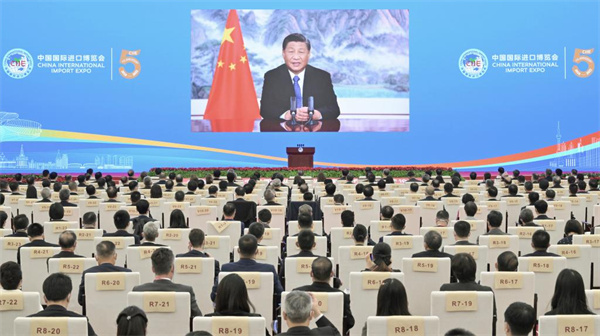
There are visible signs that the economic recovery is gaining momentum. In February, China's manufacturing purchasing managers' index (PMI) reached 52. 6 percent, a new high in nearly 11 years. The economy is expected to stabilize and rebound in the first quarter, and foreign investment expectations remain positive.
The Canton Fair plans to increase its exhibition booths to nearly 70,000 this year. The China International Import Expo, the China International Fair for Trade in Services, and the China International Consumer Products Expo, all of which are strongly backed by Xi, are expected to see an expansion in their scales.
From building a socialist new countryside to building a beautiful China, from artistic creation to cultural-ethical advancement, Xi has made new arrangements covering all important areas.
Xi emphasized that achieving the great rejuvenation of the Chinese nation requires the complete reunification of the motherland, which is both necessary and achievable, and he has formulated a general strategy to resolve the Taiwan question.
In his speech delivered before the conclusion of this year's "two sessions," Xi said external interference and separatist activities seeking "Taiwan independence" must be resolutely opposed, stressing firmly advancing the national reunification process.
"Xi is an idealist and a pragmatic person. He is sober, practical, decisive, has a broad vision and a systemic view," said a cadre who had worked with him in Zhejiang province in the early 2000s. "He is good at turning crises into opportunities, and can see a blueprint through to the end. "
PEOPLE'S LEADER
Xi is not just for the people but of them.
When he labored alongside rural farmers, he learned to grit his teeth while hauling manure and ignored the constant hunger pangs as he worked the land. These formative years taught him the true value of these often overlooked members of society, leaving him with a natural ability to connect and listen to ordinary people to help resolve their problems.
He may have left the fields decades ago, but even as general secretary, he has not forgotten those that toil there nor those that man the country's backbone industries, from workshops to markets. He has remained committed to maintaining a public-facing presence through personal visits or correspondence.
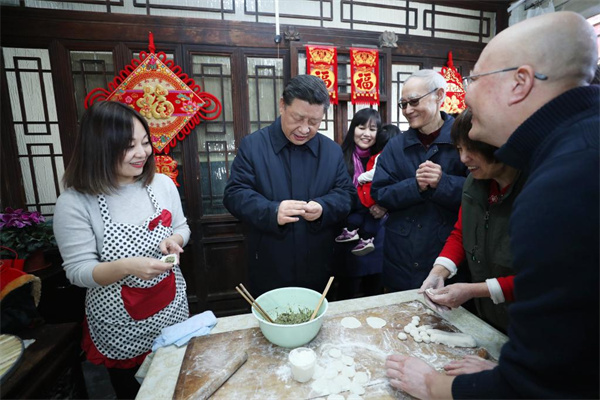
During one visit to a Beijing hutong, the capital's distinctive residential lanes, Xi rolled up his sleeves to make dumplings with one family, and the conversation flowed. Before he left, Xi confided that he draws strength from such interactions.
In spite of his busy schedule, Xi has consistently prioritized people's happiness as essential. On more than one occasion, he said, "Development should benefit all individuals more equitably and comprehensively, and continually promote the all-around development of people. "
At the start of the year, Xi was unanimously voted in as a deputy to the 14th NPC through a competitive election in Jiangsu. He was just one of over 2,900 deputies elected nationwide, representing the country's dynamic socio-economic diversity, from workers to farmers, technical professionals to migrant workers.
On March 5, Xi joined his fellow deputies from the Jiangsu Province delegation at the NPC session to deliberate the government work report and discuss state affairs.
The Jiangsu deliberation was not the only meeting Xi attended at this year's "two sessions," nor was it the only time he has interacted with lawmakers and political advisers.
From 2013 to 2022, Xi attended 53 deliberations and discussion sessions, speaking directly to about 400 lawmakers and political advisers. From asking about the marriage rate of an underprivileged central Chinese village to pressing for details of the winter tourism industry in the northeastern province of Jilin, his questions are always poignant and relevant.
People familiar with Chinese politics view such interactions as a manifestation of Chinese democracy. Accordingly, it is no surprise that Xi has gained a reputation for supporting public empowerment in their own affairs and encouraging their participation in political affairs.
"China is a big country. It is only natural for different people to have different concerns or views on the same issue. What matters is that we reach consensus through communication and consultation," Xi said in his New Year Address 2023.
In June 2022, China completed the election for the county and township-level people's congresses. The election involved 1. 064 billion voters. It was one of the world's largest grassroots democratic elections.
The people's congress is the backbone of China's political system, and NPC deputies are responsible for a wide range of duties, including formulating laws, supervising the government and judicial organs, and electing national leaders.
Each of the country's 55 ethnic minorities is represented in the national legislature. Dong Caiyun is a member of the Bao'an ethnic group, which has a population of only about 20,000.
At the "two sessions" in 2019, she proposed a new expressway that would boost the development of her county in Gansu province, northwest China. Other deputies lauded her proposal, and Xi, who was present at the meeting, responded by asking the relevant departments to study the proposal.
After rounds of research and feasibility studies, construction began. It is due for completion this year.
"This road represents the aspirations of the people in my hometown for a modern life," said Dong.
Quan Taiqi, who works at a bus station in Lianyungang, Jiangsu, has just completed her second term as a deputy to the national legislature. She voted for Xi to be the Chinese president five years ago.
"I endorsed him [as president] because I believe he is a trustworthy leader who truly cares for the people," she said.
She recalled that Xi was present during a deliberation years ago when she raised an issue about ticket-free child passengers on buses, who might cause over-sale of tickets. Xi immediately spoke up, taking Quan by surprise, as she thought the topic was too specific and menial for a state leader. Xi not only spoke up, but also asked about the practice on trains for reference. After the meeting, a review of the issue quickly began, culminating in a practical plan.
"When Xi spoke to us grassroots deputies, he was not condescending. He quizzed us, 'Is it like this?' 'Is this good or not?'" Quan recalled.
During the "two sessions" in 2021, Quan met Xi again. She went up to him and brought up their previous interaction. However, the corridor was crowded, but as he left, Xi said, "Let's talk about it later. " Quan thought that would be the end of their conversation, but around 11 p. m. that night, she received a call from Xi's team, asking if she had any suggestions or problems to raise.
Xi believes that democracy is a requirement for modern countries, but it must be in line with national conditions, and Chinese democracy should by no means be the same as Western-style democracy. He describes Chinese democracy as a "whole-process people's democracy," which covers all aspects of the democratic process and all sectors of society.
"The purpose of democracy is to address the issues that require resolution by the people," he said.
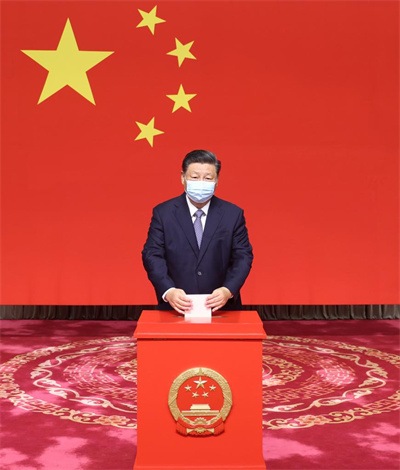
Challenges to the system are not tolerated.
According to one witness, during a plenary session of the anti-corruption agency in 2014, Xi discussed at length a vote-buying case in the election of local lawmakers in Hunan. Visibly angered, Xi fired a barrage of questions: Where have the Party members gone? Where are their notions of Party discipline and law? Where is their conscience?
Afterward, Xi referred to this case on at least two other occasions. Eventually, 467 people were held accountable.
The Chinese practice of modernization has often been viewed by observers as difficult, especially given China's massive scale -- unprecedented since the Industrial Revolution in Europe. Xi has stated that even feeding over 1. 4 billion people is a significant challenge. Issues such as employment, distribution, education, healthcare, housing, elderly care, and child care should not be underestimated, especially given the size of the population.
According to Xi, advancing Chinese modernization requires a new journey of law-based governance. The issue of the rule of law versus the rule of man is a fundamental question and major issue that all countries must address in the process of modernization, Xi said.
In a signed article commemorating the 40th anniversary of the current Constitution's promulgation and implementation, Xi emphasized the Constitution's role in constructing a modern socialist country and the great rejuvenation of the Chinese nation.
On Monday, Xi and other NPC deputies voted to amend the Legislation Law, adding content to promote the implementation of the Constitution. In 2018, Xi was the first Chinese president to pledge allegiance to the Constitution. Last week, after being elected, Xi took the oath again, followed by members of his governance team.
CHAMPIONING PEACE, DEVELOPMENT
In the second half of last year, Xi returned to "offline" diplomatic activities after the "cloud diplomacy" that characterized the two a half years of the pandemic.
Over the past four months alone, Xi attended the G20 Summit in Bali, the APEC Economic Leaders' Meeting in Bangkok, the first China-Arab States Summit, and the China-Gulf Cooperation Council Summit in Riyadh.
On the sidelines of the multilateral events, Xi also held bilateral meetings with leaders from dozens of countries, including France, the Netherlands, Australia, the Republic of Korea, Japan, Indonesia, Saudi Arabia, Egypt, and Iraq.
At home, Xi hosted many foreign leaders and dignitaries in Beijing after the Party congress. The guests included leaders from Vietnam, Pakistan, Tanzania, Germany, Cuba, Mongolia, Laos, Russia, the Philippines, Iran, and Belarus. For some, this marked their first visit to China, while others were "old friends. "
Over the past decade, Xi has clearly conveyed that China will create new opportunities through development and add more stability and certainty to such a volatile world.
"As it develops, China will make greater contributions to the common prosperity of the world," Xi said.
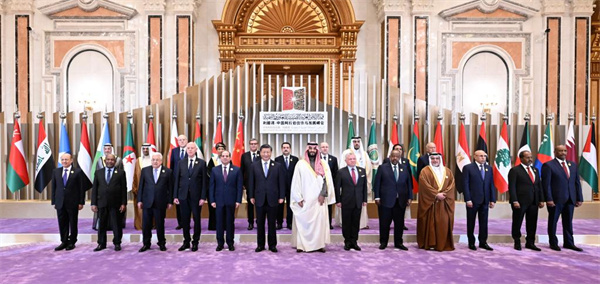
During his meeting with Qatari Emir Sheikh Tamim bin Hamad Al Thani in Riyadh in December, Xi mentioned the FIFA World Cup hosted by Qatar, saying that the event injected fresh and positive energy into today's uncertain world. Tamim thanked China for its contributions to the World Cup, noting that Chinese companies built the main stadium, and the arrival of two pandas added to the festive atmosphere of the tournament.
The stadium Tamim mentioned is Qatar's Lusail Stadium, which hosted the final game of the World Cup between Argentina and France. It is regarded by many as an iconic achievement of the Belt and Road Initiative (BRI).
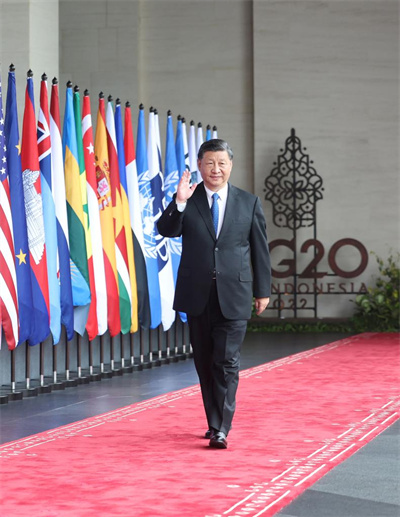
The BRI, proposed by Xi in 2013, also helped Indonesia build its first high-speed railway. After the G20 Summit in Bali, Xi and Indonesian President Joko Widodo watched the operational trial of the Jakarta-Bandung High-speed Railway through a video link. The railway, jointly built by the two countries, is expected to facilitate the move of goods and people and boost local incomes.
To date, 151 countries and 32 international organizations have signed documents under the Belt and Road framework, benefiting participating countries.
The Port of Piraeus of Greece has developed into one of the fastest-growing container ports in the world since a Chinese company joined its operation.
Another important proposal Xi raised in 2013 was the community with a shared future for humanity. It has been enshrined in both the Party and the country's constitutions and incorporated into important documents of the United Nations and other international organizations or multilateral mechanisms.
Xi told the G20 summit that all countries must embrace the vision of a community with a shared future for humanity and advocate peace, development, and win-win cooperation.
"All countries should replace division with unity, confrontation with cooperation, and exclusion with inclusiveness," Xi said in the speech.
He also solemnly promised the world, "No matter what stage of development it reaches, China will never seek hegemony or engage in expansionism. "
He believes that as long as major countries maintain communication and treat each other sincerely, the "Thucydides trap" can be avoided.
China has shown the world that a country can develop and progress without engaging in expansionism, and can help other countries develop simultaneously, said Iranian President Ebrahim Raisi in a signed article published before he visited China in February.
In response to Xi's initiative, Saudi Arabia and Iran delegations held talks earlier this month in Beijing. The two countries have reached an agreement to resume diplomatic relations and reopen embassies and missions within two months.
One of Xi's most high-profile diplomatic meetings in the past months was his first face-to-face meeting with U. S. President Joe Biden since the latter assumed the presidency. During the over-three-hour talk in Bali on Nov. 14, Xi told Biden that China-U. S. relations should not be a zero-sum game where one side outcompetes or thrives at the expense of the other, and the successes of China and the United States are opportunities, not challenges, for each other.
"China does not seek to change the existing international order or interfere in the internal affairs of the United States and has no intention to challenge or displace the United States," Xi said.
Biden said the United States respects China's system and does not seek to change it. The United States does not seek a new Cold War and does not seek to revitalize alliances against China, he said. Biden also said that the United States does not support "Taiwan independence," does not support "two Chinas" or "one China, one Taiwan," and has no intention to engage in conflict with China.
In his meetings with European leaders, Xi stressed that regarding the Ukraine crisis, China supports ceasefire, cessation of the conflict, and peace talks.
In February, China issued a 12-point peace plan on the Ukraine crisis, stating that all countries' sovereignty, independence, and territorial integrity must be effectively upheld, and universally recognized international law, including the purposes and principles of the UN Charter, must be strictly observed. "Nuclear weapons must not be used, and nuclear wars must not be fought," said the policy paper.
Xi is a leader who provides vision and plans for promoting the solution of major problems facing humanity, said Keith Bennett, a long-term China specialist and vice chair of Britain's 48 Group Club.
PIONEERING HUMAN ADVANCEMENT
When Xi delivered his 2023 New Year Address, people noticed the tomes on the bookshelf behind him in his office, among them, A General History of China, Complete Poems of the Tang Dynasty, Global History, The Complete Works of William Shakespeare. Having called reading his favorite hobby, Xi is known to draw wisdom from the written word to govern the country.
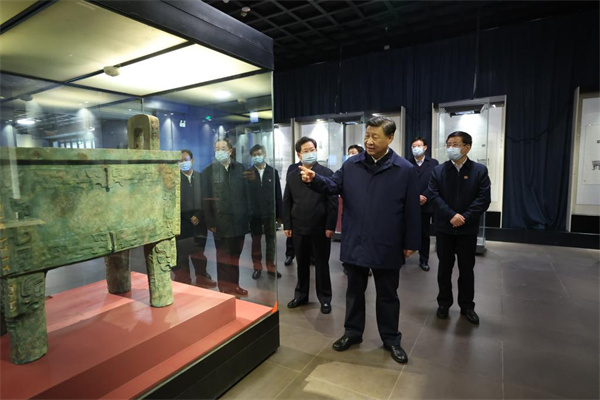
After the Party congress, Xi headed to Henan Province, central China, and visited the Yinxu Ruins. The 3,300-year-old site was the capital of the late Shang (Yin) Dynasty, the first ruins confirmed from this period. Walking slowly into the Yinxu Museum, Xi thoughtfully took in the exhibits, spanning bronze ware, jade ware, oracle bone inscriptions, and other relics.
"I have wanted to visit here for so long," Xi said. "I come here thirsty for a deeper understanding of Chinese civilization so that we can make the past serve the present and draw inspirations for better building modern Chinese civilization. "
With a long and continuous history, Chinese civilization shaped our great nation, and this nation will continue to be great, Xi added, urging efforts to promote traditional culture, which according to the leader, is the "root" of the Party's new theories.
Xi proposed combining the basic principles of Marxism with traditional culture, believing that only when a country's modernization is rooted in the fertile soil of its history and culture can it flourish and endure.
In 2014, Xi said he was reluctant to see Chinese classic poems and essays removed from the textbooks when visiting Beijing Normal University. In November 2013, he visited Qufu, the birthplace of Confucius, and the following year, he addressed an international commemoration of the ancient Chinese philosopher. In 2021, when he visited a park dedicated to Zhu Xi in east China's Fujian province, Xi stopped for a long time in front of the words of the renowned Chinese Confucian philosopher in the 12th century. Zhu famously said that a nation is based on its people, and society is also established for the benefit of its people. Xi, in an earlier group study session of the Political Bureau of the CPC Central Committee, had quoted Zhu's words, stressing that no political consideration is more important than the people.
Xi has repeatedly lamented the humiliation and defeat suffered by the Chinese nation, despite its place at the forefront of the world over the past 5,000 years.
In particular, he felt that China's modernization had achieved significant results "at great cost and with great hardships. " He stressed China, therefore, should blaze its own trail toward modernization. Experts believe that Chinese modernization, which offers a new form of human advancement, dispels the myth that "modernization is equal to Westernization. " Xi said efforts must be made to achieve higher efficiency than capitalism while maintaining fairness in society more effectively.
According to Zheng Yongnian, a professor at the Chinese University of Hong Kong (Shenzhen), Chinese modernization is a way to deal with the problems all countries face. Above all, the source of its vitality is mainly sustainable economic development, he said.
British scholar Martin Jacques believes that if China can successfully address inequality in the way it has conquered absolute poverty, such fairer and more inclusive modernity will have an enormous global impact.
Xi is proud and confident of the achievements and prospects of the modernization drive. He once said, "China has been able to look the world in the eye," referring to the country's rise in strength. This, however, does not mean the pursuit of unilateral dominance, still less a clash of civilizations. He cited the famous "sleeping lion" metaphor for China and noted, "Today, the lion has woken up. But it is peaceful, pleasant, and civilized. "
He has underscored that China will not follow in the footsteps of certain countries that achieved modernization through war, colonization, and plunder, and that China upholds peace, development, cooperation, and mutual benefit, which is determined by the Chinese system and culture.
A phrase containing "promote humanity's shared values of peace, development, fairness, justice, democracy, and freedom" was written into the Party Constitution last year.
Xi also modestly proposed that socialism in the primary stage must conscientiously study and draw on the beneficial achievements of civilization created by capitalism. "The cause of promoting Chinese modernization, which is an unprecedented and pioneering venture, will inevitably encounter all kinds of risks, challenges, difficulties, and even dangerous storms, some of which we can foresee and others we cannot," Xi said. "Let us harness our indomitable fighting spirit to open new horizons for our cause. "
"Those who work will succeed, and those who walk will arrive at their destination. A person of action will leave a good name in history," he said.